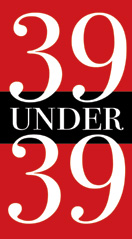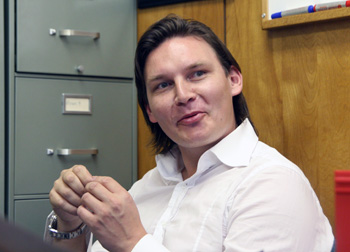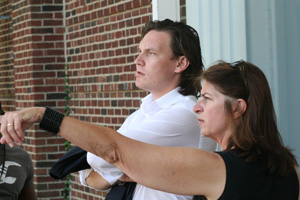Russian Bulldog Refused to Quit
by Gary James '10 January 7, 2009
When Victor Koshkin ‘96 attended Wabash, he earned the nickname "Russian Bulldog," not for his temperament but for his stamina. As a senior Economics major and international student seeking a job on Wall Street, he never quit. Now he brokers large business deals in another continent.
"I think Victor was the student that first opened up a different kind of relationship with faculty," Widdows said. "Now he’s like family. He worked very hard and he’s very focused. Once he went at something he wouldn’t let it go."
Koshkin’s perseverance served him well his senior year, as he worked to secure a job. For months, he applied for positions at investment banks with no luck. With a Career Center just getting off the ground, Koshkin appealed to alumni for help. He acquired an alumni directory, and made calls to Wabash graduates living in Chicago, Philadelphia, and New York City. Koshkin followed every lead he was given, hoping to find someone who could connect him with a job in the financial industry. He found that connection in alumnus Dick Sword ‘76.
"Nobody had ever heard of Wabash," Koshkin recounted. "It was difficult. I had stacks of letters saying ‘Thank you very much. We accepted your application.’ Then a few weeks later I would get letters saying, ‘Thank you very much. We have a lot of over- qualified candidates.’ Every week I would give Sword an update."
Sword guided Koshkin’s job search efforts for months, and Koshkin created a list to keep track of all his efforts. He used it to update Sword on his progress: initial contact, second contact, outcome, and status. The status for his nearly 40 attempts was negative, until he finally got a break.
"Dick was following this for like three months," Koshkin said, with gratitude in his voice. "He said, ‘grab a pencil' and gave me names. I called. It worked. I got three offers, one from Goldman Sachs, one from Solomon, and one from Lehman Brothers. It’s not that he personally did this, but he put me in contact with someone."
After scores of interviews, he accepted a job at Lehman Brothers in New York City, where he rose to the position of Associate by the time he left in 1998.
From Lehman Brothers, Koshkin went on to JP Morgan, where he worked with the telecommunications industry. He also maintained his relationship with Sword who encouraged him to branch outside of business. Koshkin joined the YMCA Internaional Board of Directors, and helped increase the organization’s budget by changing the way it stored its money and outsourcing its Visa-granting authority. He organized a precursor to the current Business Immersion Program, which gave students hands on experience in the Business world. Some students even received job offers through the program.
In 2000, Koshkin enrolled in Harvard Business School with the help of the economic professors with whom he had developed friendships. They spent six months helping Koshkin prepare to get into the only school he applied. He was accepted and received his MBA in 2002.
After the market declined in the wake of the September 11 attacks, Koshkin went back to Russia, where he brokered large business deals. Since 2003, he has helped successfully negotiate the merger of two pipe-making plants worth $1.2 billion and sell Saul, the largest aluminum company in the world. When he visited Wabash in August 2008, Koshkin was considering becoming a share holder of a small company which makes transformers for electricity.
For Wabash students, his message is never give up and never be afraid to ask for help.
"Reaching out to professors and alumni is number one," Koshkin said. "Don’t be shy or afraid to contact alumni because most of them will answer your call. Also you should study really hard. I was always trying to do the best I can. Wabash teaches you not just what’s in the book but to take it a step further somehow, to be an innovator. Another idea is to practice at school because you can make mistakes here."
Dr. Widdows said Koshkin’s is a good example.
"I think he showed time and time again you can take a risk and be successful," she said. "And that’s hard to teach. Don’t give up if it doesn’t work the first time, if the first 30 companies you talk to say no, you just can’t give up."
Photos by Steve Abbott '09
|

|

 Born in Serbia, Koshkin lived a mobile childhood. By age 20, He had resided in Hungary, Bela-Russia, Mongolia, Lithuania, and the United States. He now lives in Moscow. While a foreign exchange student in Indiana, Koshkin’s host mother encouraged him to apply to Wabash. He was accepted and decided to major in Economics and minor in German. Koshkin also developed a strong relationship with members of Econ department, specifically Professors Keahola Widdows, Bert Baretto, and Frank Howland.
Born in Serbia, Koshkin lived a mobile childhood. By age 20, He had resided in Hungary, Bela-Russia, Mongolia, Lithuania, and the United States. He now lives in Moscow. While a foreign exchange student in Indiana, Koshkin’s host mother encouraged him to apply to Wabash. He was accepted and decided to major in Economics and minor in German. Koshkin also developed a strong relationship with members of Econ department, specifically Professors Keahola Widdows, Bert Baretto, and Frank Howland. Koshkin largely credits his semester off-campus in Philadelphia during his junior year with giving him the edge in his eventual success. While in Philadelphia, he interned at Jay and Montgomery Scott, an investment bank. "In business if you are trying to get a job on Wall Street as a foreigner, it’s not that simple," Koshkin said. "If I didn’t go to Philadelphia, there was no way I could have gotten a job at Lehman. I strongly recommend it to anyone who wants to go into business."
Koshkin largely credits his semester off-campus in Philadelphia during his junior year with giving him the edge in his eventual success. While in Philadelphia, he interned at Jay and Montgomery Scott, an investment bank. "In business if you are trying to get a job on Wall Street as a foreigner, it’s not that simple," Koshkin said. "If I didn’t go to Philadelphia, there was no way I could have gotten a job at Lehman. I strongly recommend it to anyone who wants to go into business."




























